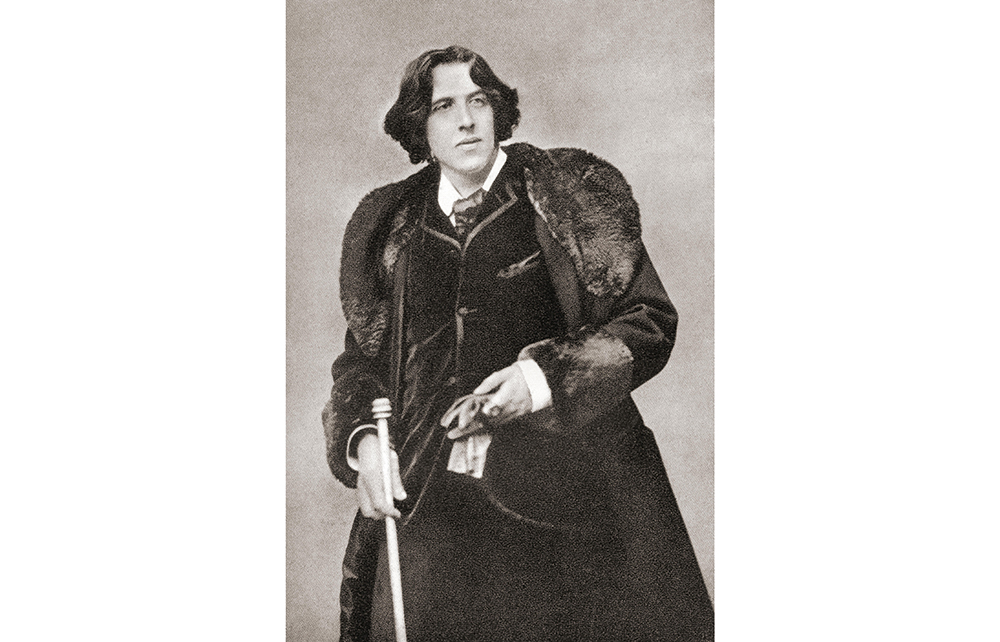The Importance of Being Earnest was NBC’s first coast-to-coast broadcast of a play in 1929. It was ideal for radio, partly because Oscar Wilde’s crisp dialogue obviated any need of facial expressions or gestures. Epigrammatic speech, as Noël Coward found, was a signifier of modernity in the 1920s. Beyond that, as Kate Hext shows, the America of Calvin Coolidge and Herbert Hoover had a sinewy and hardy sympathy for the Anglo-French fin-de-siècle literary mode of the 1890s known as Decadence.
Wilde’s philosophy of life was an antidote to corporate America, Wall Street and meddlesome neighbours
For too long, Hext argues, historians have focused on the American Dream as a mercenary business, concerned with the optimisation of personal wealth, sociopathic ambition, competitive ruthlessness, grinding long hours of work, mass production, cultural uniformity, winners and losers and he-men and patsies. Yet, she continues, Wilde, shorn of his sexual deviance and disassociated from pretty boys, offered a philosophy of life that was an antidote to corporate America, Wall Street, provincial pettiness and meddlesome neighbours. His state of mind gave a sort of subversive hope to men and women – especially those in the Midwest and West – who hankered to live more for pleasure than profit. Putting the sexual history aside, Wilde’s writings were a gallant and inspiriting counter to killjoys and the insatiable demands of wage slavery. Wilde satisfied a yearning for non-monetary fulfilment and recreational rapture.
The Picture of Dorian Gray, says Hext, is the story of a habitual criminal. In pursuit of his ideal of perfect beauty and voluptuous living, Gray steals, blackmails, uses opium, visits dens of iniquity, performs illegal sexual acts, learns the tricks of coiners and commits murder. He becomes, in Wilde’s depiction, a dandy criminal performing acts of fabulous duplicity. As such, Gray is a harbinger of that dominant 20th-century phenomenon, the cinematic crime thriller.
Some gay American men were drawn to Wilde by his sexual history and public tragedy. Vincente Minnelli, a descendant of Sicilian revolutionaries who grew up in Delaware, Ohio, was enthralled by Wilde while working as a teenage window-dresser in Chicago. He became a set designer, then a theatre director, always touched by the visual inflexions of the Decadents. After 1940, as ‘the Oscar Wilde of the camera’, he directed the greatest Hollywood musicals at the apogee of their fashion.
Wilde’s subversive strains also appealed to men of conventional sexual habits. Although H. L. Mencken disliked the idea of buggery, he admired Wilde’s baiting of puritans and emulated his aphoristic put-downs of women. Wilde’s work was readily adaptable to the tastes of vaudeville audiences who whooped and whistled at drag artists. There were similar frissons, no doubt, in the Nickelodeon film Salome, or the Dance of the Seven Veils (1908) and spin-offs such as If You Had a Wife Like This (1909).
Hext gives a rich and fulfilling account of the Hollywood screenwriter and crypto-Wilde, Ben Hecht. Born into a Yiddish-speaking family which ran a small store in Racine, Wisconsin, he was heterosexual. But his sympathy always lay with miscreants, anti-bourgeois dandies, dissidents, unsuccessful smart alecs and no-hopers. While a reporter on the Chicago Daily News in 1914-23, he modelled himself on Baudelaire, and read Verlaine and Mallarmé. The decadence of Dorian Gray and of Huysmans’s À rebours delighted him.
The Front Page (1928), the boisterous comedy about a Chicago newsroom which Hecht co-wrote, depicts hard-bitten hacks reading Huysmans, Gautier, Arthur Symons, Walter Pater and other Decadent writers. Hecht’s snappy film-scripts lift lines and sentiments from A Woman of No Importance and Lady Windermere’s Fan. In Crime Without Passion (1934), the male lead recites verses from Swinburne’s sadomasochistic poem ‘Dolores’ (1866). In Mad Love (1935), Peter Lorre, playing the murderous Dr Gogol, declaims ‘The Ballad of Reading Gaol’ at the film’s homicidal climax.
Hecht’s gangster aesthetes dominate his scripts for such classic films as Underworld (1927), Little Caesar (1931) and Scarface (1932). The he-men in these films are rash, hypersensitive and perfectionist in their wishes and nihilistic in practice. They have a self-harming need of excitement, regardless of the price. One of Hecht’s narrators says that they ‘lie, quibble, cheat, steal, four-flush and kill, each and all inspired by the solacing mono-mania that every one of their words and gestures is a credible variant of perfection’. Their exacting taste drives them to the merciless, inhuman pursuit of precious objects. In the expectation of an early death, they want immediate gratification, not deferred pleasures. They prefer sudden exhilaration to stability. A cinematic culmination of Wilde’s gangster aesthetes is Edward G. Robinson taking the lead role in a Hollywood adaptation of one of Wilde’s stories, ‘Lord Arthur Savile’s Crime’.
The thesis of Wilde in the Dream Factory invites scoffing before one reads it. But Hext is a subtle, observant, lively and persuasive writer. She knows her stuff and never takes it too solemnly. Her book is a winner.






Comments